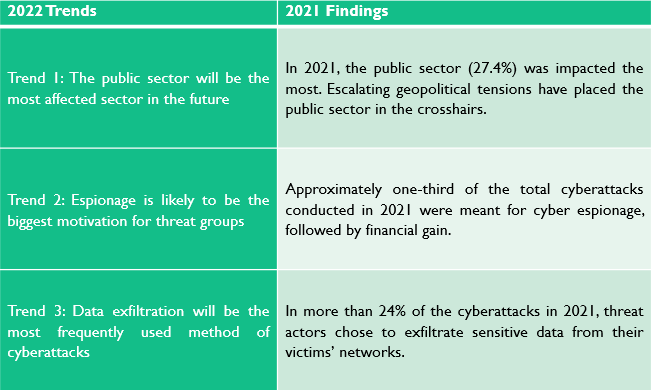
Singapore records highest fintech funding in three years amidst a global slowdown
Singapore is leading the line in strengthening ASEAN’s cybersecurity landscape
- Asia Pacific region experienced 23.5% of the total cyber issues reported in 2021
- The ASEAN-Singapore Cybersecurity Centre of Excellence seeks to strengthen member governments’ capacities for developing cybersecurity policies, conducting research and developing cybersecurity strategies
Beware, there will be a big avalanche of new cyber risks as the years pass, broadening the cybersecurity landscape. The threat landscape has experienced a mixture of change and stagnation over the past year, with the COVID-19 pandemic leading to the rise of remote work and supply chain issues. What’s next? Monkeypox cyberattack?
Any cyber threat, regardless of its kind, should be treated seriously, and businesses should constantly be ready.
Let’s look at the cyberattack that has been leading the movement: As of December 31, 2021, there have been 2,686 ransomware-related data exposures, up from 1,474 in 2020, according to CrowdStrike Intelligence. These numbers demonstrate how important victim data is to enemies, along with other data leaks.
Corporations are anxious about the future threats they will face precisely because of ransomware and a few other known and undiscovered cyber threats. Luckily, certain nations around the world have begun taking this seriously. For instance, Singapore is just one of many ASEAN nations driving the improvement of the region’s cybersecurity landscape.
CyberRes, a Micro Focus business unit, has announced the release of its inaugural Annual Report on the current state of cyber threats today and a global overview of cyber events in 2021. This strategic analysis is the first of a series that will offer a perspective on threat conditions in the geopolitical, regional, and business sectors as well as predictions for the coming year.
The state of the cybersecurity landscape in APAC
With 23.5% of all reported cyber concerns, Asia Pacific is one of the most affected regions in 2021. North America, which topped the list with 33.5%, is behind the region on the list.
Based on significant discoveries from the previous year, the report provides useful insight into potential threats in the region this year, including:

Insights on potential threats in the region.
However, the cyber landscape, industry impact, and projection for 2022 differ across markets.
For instance, some of the most significant events that occurred in 2021 had an impact on Singapore. This includes the SITA supply chain incident, which had an effect on numerous airlines globally. One of the biggest local mobile carriers was impacted by another significant incident that saw the exfiltration of 129,000 customer records along with other sensitive information.
Having said that, Singapore is leading the charge in improving ASEAN’s cybersecurity landscape. The ASEAN-Singapore Cybersecurity Centre of Excellence aims to strengthen member states’ capacities for developing cybersecurity policies, legislation, and research. By implementing the ASEAN Regional Action Plan (2021–2025), which aims to improve areas like research collaboration, knowledge sharing, and training, ASEAN countries are generally outpacing the rest of the world in cybersecurity.
According to Stephen McNulty, President of Micro Focus’ Asia Pacific and Japan division, the sheer number of cyberattacks that occurred worldwide last year had a long-lasting impact on all businesses and people. Adversaries are sadly continuing this pattern into 2022 by fast exploiting holes in the digital value chain.
“The good news is that Asia Pacific has a massive opportunity to reverse or contain the numbers moving forward, with a clear understanding of the landscape and tactics now and in the future. This knowledge is a powerful defense,” he added.
On a separate note, in support of Singapore enhancing the cybersecurity landscape, Fortinet, a cybersecurity company, has announced a partnership with Singapore’s Quantum Engineering Program (QEP) to aid in the development of the country’s National Quantum-Safe Network (NQSN). To protect digital transactions from sophisticated cyber threats, the NQSN aims to build an ultra-secure communications and services infrastructure.
READ MORE
- Ethical AI: The renewed importance of safeguarding data and customer privacy in Generative AI applications
- How Japan balances AI-driven opportunities with cybersecurity needs
- Deploying SASE: Benchmarking your approach
- Insurance everywhere all at once: the digital transformation of the APAC insurance industry
- Google parent Alphabet eyes HubSpot: A potential acquisition shaping the future of CRM


